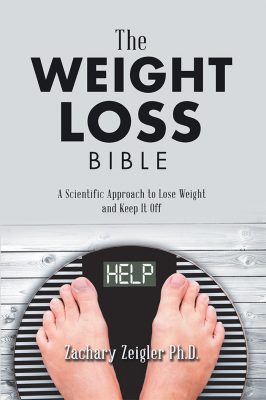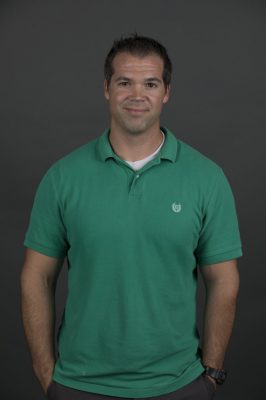
By Lana Sweeten-Shults
GCU News Bureau
Everyone in the entire galaxy wants to lose weight.
If you doubt it, ponder these statistics, from a 2003-08 national survey of almost 17,000 Americans: 73 percent of women and 55 percent of men said they wanted to lose weight, and 50 percent of women and 30 percent of men actually made some weight-loss efforts the previous year.
Not to dash your hopes, and just in case you wanted to hear something woeful, here it is (if you didn’t want to hear anything woeful, sorry): “Most persons will not stay in treatment for obesity. Of those who stay in treatment, most will not lose weight, and of those who do lose weight, most will regain it,” according to “Pain of Obesity” author Dr. Albert J. Stunkard.

“If you want to lose weight, that kind of sucks to hear that statement,” said College of Science, Engineering and Technology’s Dr. Zachary Zeigler, who presented a talk to a packed room Wednesday on his new book, “The Weight Loss Bible: A Scientific Approach to Lose Weight and Keep it Off.”
Zeigler said something most of us know but don’t want to admit – we haven’t been successful at losing weight over the long term.
“The way that we’re doing it is not effective. To have successful weight loss, you must look through the confines of a 24-hour day.”
You have to look at, not just dieting and exercise, but sleep, stress, the number of meals you eat per day and what time of day you eat those meals. You have to take a holistic approach.
Zeigler discounted what he calls “comforting lies:”
“OK, just remove gluten from your diet and you’ll lose tons of weight. That’s an example. Or, hey, carbohydrates, all you have to do is not do carbohydrates and you’re golden. … HCG drops. You can go down the list. The problem with the way that we view weight loss is in the confines of, oh, there’s one problem with why we’re so big as a country and we choose one of these things and we focus on it, and then we wonder why we’re not having success."
In his talk, Zeigler discussed what isn’t working, such as blaming the victim.
“My diet is the best thing ever but you didn’t want to follow it, therefore, you didn’t have success, which is not true. If you ask people, well, why didn’t you have success in your diet, people think it’s laziness, you didn’t do what I said, you binged.”
He pointed to a landmark study by Claude Bouchard in which he isolated sets of identical twins, placing them in a research facility for 100 days and controlling their diet and exercise. Dietitians prepared and brought them their meals. The subjects were made to exercise and burn 1,000 calories every nine out of 10 days – average workouts burn about 300 to 500 calories, Zeigler said.
Doing the math, the subjects should have lost about 27 pounds, or 12 kilograms. One set of twins lost about 8 kilograms each, but another set lost only 1 to 2 kilograms each.
“Now some people lost weight, but a lot didn’t, so we have got to get away from just thinking, 'Oh, just exercise, you’ll lose weight. It’s that simple.' That’s total baloney. For certain people, maybe you’ve got this genetic predisposition. … We act like it’s so simple, but it’s not,” Zeigler said.
He pointed out something else that isn’t working for those who want to lose weight.
“The average statistic is 80 to 95 percent who lose substantial weight gain it all back, so that means if you have success, unless you’re the oddball, then 80 to 95 percent of us are going to gain it all back.”
In an analysis published in 2007 called “Weight Loss Outcomes,” researchers followed 26,000 subjects in 80 studies. About a third quit their respective studies. Of those who did complete the study, regardless of the method of weight loss, peak weight loss was at six months. Average weight loss over four years was 3 to 4 percent of their initial body weight.
Zeigler said when the average woman wants to lose 32 percent of her weight, a measly three to four percent weight loss is a failure in most people’s minds.
A different study, also conducted in 2007, found that “there’s no weight loss after five years. So basically, the longer you follow a subject, the more weight they get back.”

Zeigler looked at what many see as the most successful form of weight loss – bariatric surgery.
Canadian researchers followed a group of post-bariatric patients for an average of 11 years.
“Thirty odd percent of them were complete failures,” he said. “That’s a big deal when you paid for a medical procedure where they go into your body and change the dimensions of your stomach. A third fail; they gain it all back.”
Furthermore, there’s an unintended consequence of bariatric surgery. Thirty percent of post-bariatric surgery patients turn to alcohol or other substance abuse compared to only 4½ percent before, according to a study published in 2007 in “Bariatric Times.”
Zeigler said many of us spend a lifetime losing and then regaining weight, over and over again – something called weight cycling, or yo-yo dieting. Some researchers, such as Zeigler, say weight cycling is bad. Others say it’s benign.
One 2006 study, called “Weight Cycling of Athletes and Subsequent Weight Gain in Middle Age,” looked at more than 1,100 male athletes who had represented Finland in the Olympics. Some competed in sports that required them to meet a weight class and so were classified as weight cyclers, others didn’t meet that requirement, and still others were included as a control group. The study was started when the athletes were in their 20s and ended when they were 65. Athletes classified as weight cyclers gained more weight over their lifespan.
Zeigler said an abundance of research shows weight cycling is associated with such conditions as cardiovascular disease, possibly because of increased blood pressure, as well as bone loss and breast cancer.
“The area of the strongest body of literature is what weight cycling does to our body fat distribution,” he said.
Constantly losing and regaining weight, he said, could change your fat distribution. Zeigler and colleagues at Arizona State University, where he received his doctoral degree, wanted to find out if weight cycling affects arterial stiffness (and high blood pressure).
“What we found is, directly, it didn’t, but it increased visceral fat. Those that increased their visceral fat from weight cycling increased their arterial stiffness. Why weight cycling is so bad is probably because of the visceral fat -- the belly fat.”
When weight is distributed in your fat and thighs, that’s seen as more protective against heart disease, Zeigler said, but belly fat “is actually negative for your health.”
He noted that, in the end, “Forcing someone to lose weight when they’re just going to gain it back may be worse than saying, hey, stay where you’re at. Let’s eat right and exercise.”
One more thing that might be another hope-dasher for some people: Weight loss might not be as important as we think it is in the scope of overall health. In every population study he has looked at, he said it’s better to be fat and fit than underweight and unfit.
He took into account liposuction research in 2004 that looked at patients who had abdominal liposuction surgery and then maintained their normal daily routines for 12 weeks. Looking at the health outcomes, the researchers didn’t see a difference in LDL cholesterol, HDL cholesterol, triglycerides, glucose and blood pressure. Just removing the fat didn’t do anything, Zeigler said.
“Maybe being a little fluffy, if you’re eating right, you’re exercising, maybe that’s not that big of a deal,” Zeigler said.
He added, “An easy solution, and most people don’t like to hear this, is, 'Who cares about what you weigh?' I know that’s not popular. … I’m not saying that a healthy lifestyle is not important. Of course it is. But I hope that we make a point that a healthy lifestyle does not always equate with weight loss. They’re two different things.”
Zeigler said you can diet and exercise all you want, but if you don’t consider other factors like stress, the time of day you eat and so much more, “You’re not going to have success.”
You can reach GCU Today senior writer Lana Sweeten-Shults at 602-639-7901 or at [email protected]. Follow her on Twitter @LanaSweetenShul.



































































